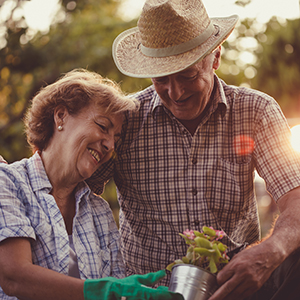Beat the Heat

Extreme summer temperatures can put you at risk for heat-related illnesses. But you can still enjoy the summer by being careful when the weather heats up.
In this blog:
- Who’s Most at Risk?
- Ways to Stay Cool
- If You Don’t Have Air-Conditioning
- How to Handle Heat-Related Illness
Who's Most at Risk?

Your health, age, and lifestyle may raise the threat of a heat-related illness – such as heat stroke, cramps, or a rash. These factors may increase your risk:
- Exercising in the heat
- Age (children and older adults 65+)
- Being substantially overweight or underweight
- Poor circulation, inefficient sweat glands, and changes in the skin caused by normal aging
- High blood pressure or other conditions that need changes in diet. For example, people on low-salt diets may face an added risk (but don't use salt pills without asking your healthcare provider)
- A long-term (chronic) health condition or any illness that causes weakness or fever
- Drinking alcohol
- Limited mobility
- Taking certain medicines that interfere with how the body normally responds to heat, including water pills (diuretics), sedatives, tranquilizers, and some heart and blood pressure medicines.
Know Where to Go for Care
Whether you’re dealing with a heat-related illness or simply not feeling well, it can be challenging to know where to seek the timely care you need. Between primary or urgent care, or the emergency department, let us help you find the right care for you and your loved ones.
Ways to Stay Cool
Focus on Fluids
Drink plenty of cool liquids – and don't wait until you're thirsty. Here’s what to opt for:
Say Yes to:
- Water
- Low-sugar sports drinks
- Plain or flavored soda water (you can add a splash of fruit juice for flavor)
Avoid:
- Alcohol
- Caffeine
If you’ve been told to limit your fluids, ask your healthcare provider about the best ways to stay hydrated.
Dress for the Weather

Beyond sleeveless tops and shorts, some people find natural fabrics such as cotton to be cooler than synthetic fibers like polyester. Light-colored clothes feel cooler than dark colors.
Avoid Outdoor Activities
Don't try to exercise, do yard work, walk long distances, or do a lot in general when it's hot. Help children have fun with indoor activities that keep them out of the sun. Likewise, don't go to crowded places when it's hot outside.
Take Cool Baths or Showers
Treating your skin to cooler water works wonders for lowering your body temperature.
Enjoy the Water
Take advantage of our many lakes or enjoy some splash time under the sprinkler. Just remember to wear a hat and the right sunscreen. Apply your sunscreen in advance before getting wet so it has time to absorb.
Take Caution While Driving
A vehicle's interior can reach substantially hotter temperatures than the outdoors. Cool down your vehicle by using a sun shade and running the air conditioning for a few minutes before driving to avoid risk. Keep water on hand to sip if you're driving distances longer than 15 minutes.
If You Don’t Have Air Conditioning
Here are some simple ways to stay cool if you don’t have air conditioning, or it’s not in your budget to keep it turned up:
- Open your windows at night – create a cross breeze by opening windows on opposite sides of the room or house.
- Close the doors to rooms you don’t use.
- Sleep in the basement if you have one or consider avoiding rooms on upper floors. Heat rises!
- Remember to turn on your exhaust fans when you shower or cook.
- Cover windows when they're in direct sunlight. Keep curtains, shades, or blinds drawn during the hottest part of the day.
- Dampen your clothing with water and sit near the fan.
- Spend the hottest part of the day in an air-conditioned place such as a library, senior center, or friend's house.
- If you no longer drive, ask a friend or family member to drive you to a cool place on very hot days. Many towns or counties, area agencies, religious groups, and senior centers also supply these services. Please don't stand outside and wait for a bus.
- Turn to local resources who can help you get window air-conditioning units or fans – or help you with cooling bills if you do have AC.
Heat Illnesses: What to Look For

Heat stress, heat tiredness, heat cramps, heat exhaustion, and heat stroke are all forms of hyperthermia. This is the general name for a range of heat-related illnesses. Symptoms may include:
- Headache
- Dizziness
- Nausea
- Rash
- Heavy sweating or clammy skin
- Skin that is dry (no sweating), hot, and red
- Muscle cramps or spasms
- Extreme weakness or tiredness
If you think someone has a heat-related illness:
- Get the person out of the sun and heat and into a cool place – if possible, one that is air-conditioned.
- Offer sips of fluids (except alcohol or caffeine). Water, sports drinks, and fruit and vegetable juices are best.
- Encourage the person to sponge off with cool water.
- Urge the person to lie down and rest in a cool place.
Is it Heat Stroke? Call 911
Call 911 or get emergency medical care right away if you suspect heat stroke. Possible symptoms of heat stroke include:
- Headache
- Dizziness
- Confusion or agitation
- Sluggishness or extreme tiredness
- Seizure
- Hot, dry skin that is flushed but not sweaty
- High body temperature
- Rapid heartbeat
- Hallucinations
- Fainting (loss of consciousness)
Questions about Your Symptoms?

If you have immediate questions about your specific symptoms, call Munson Healthcare Ask-A-Nurse at 231-935-0951. Our nurses are answering questions 24 hours a day at no charge to you.